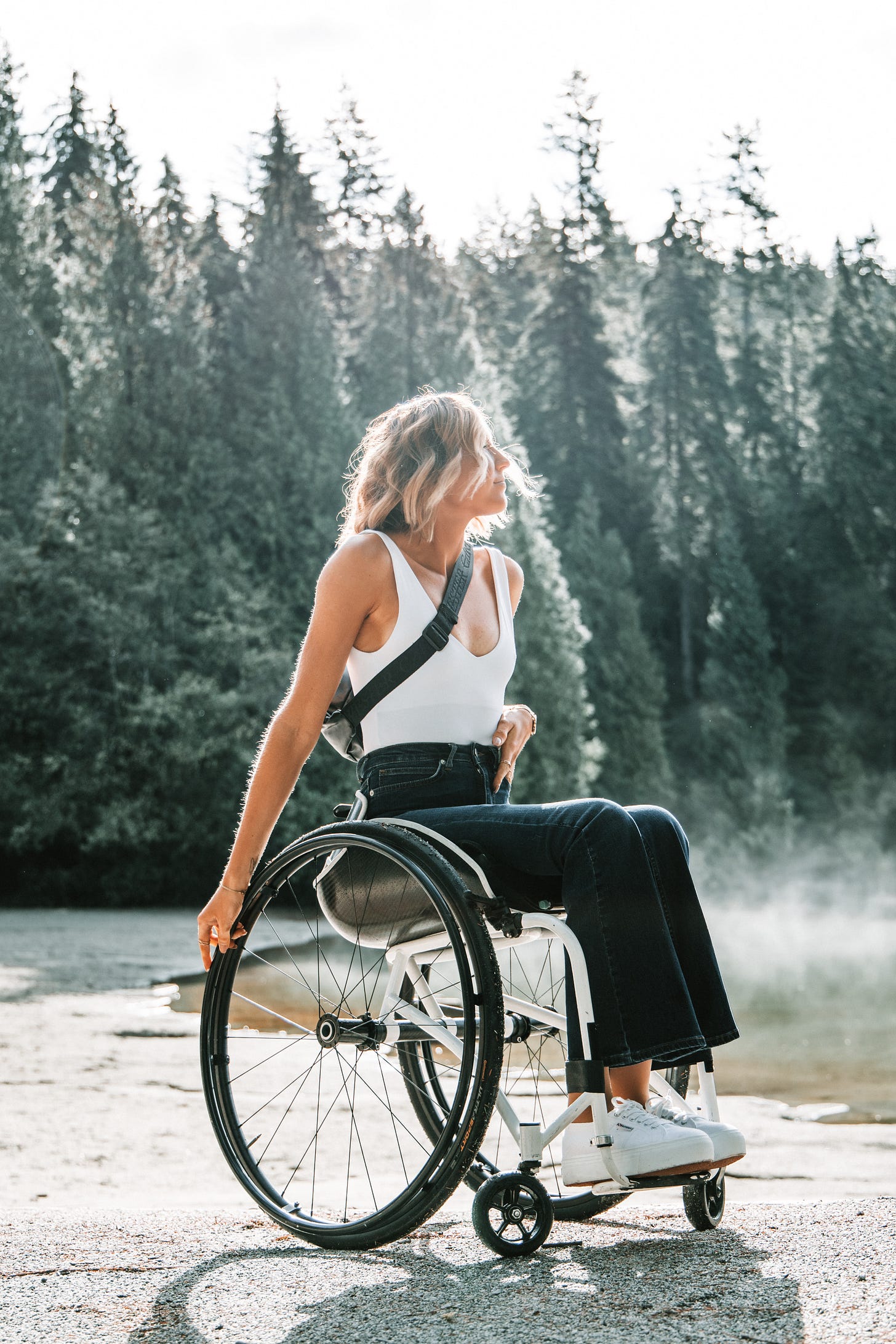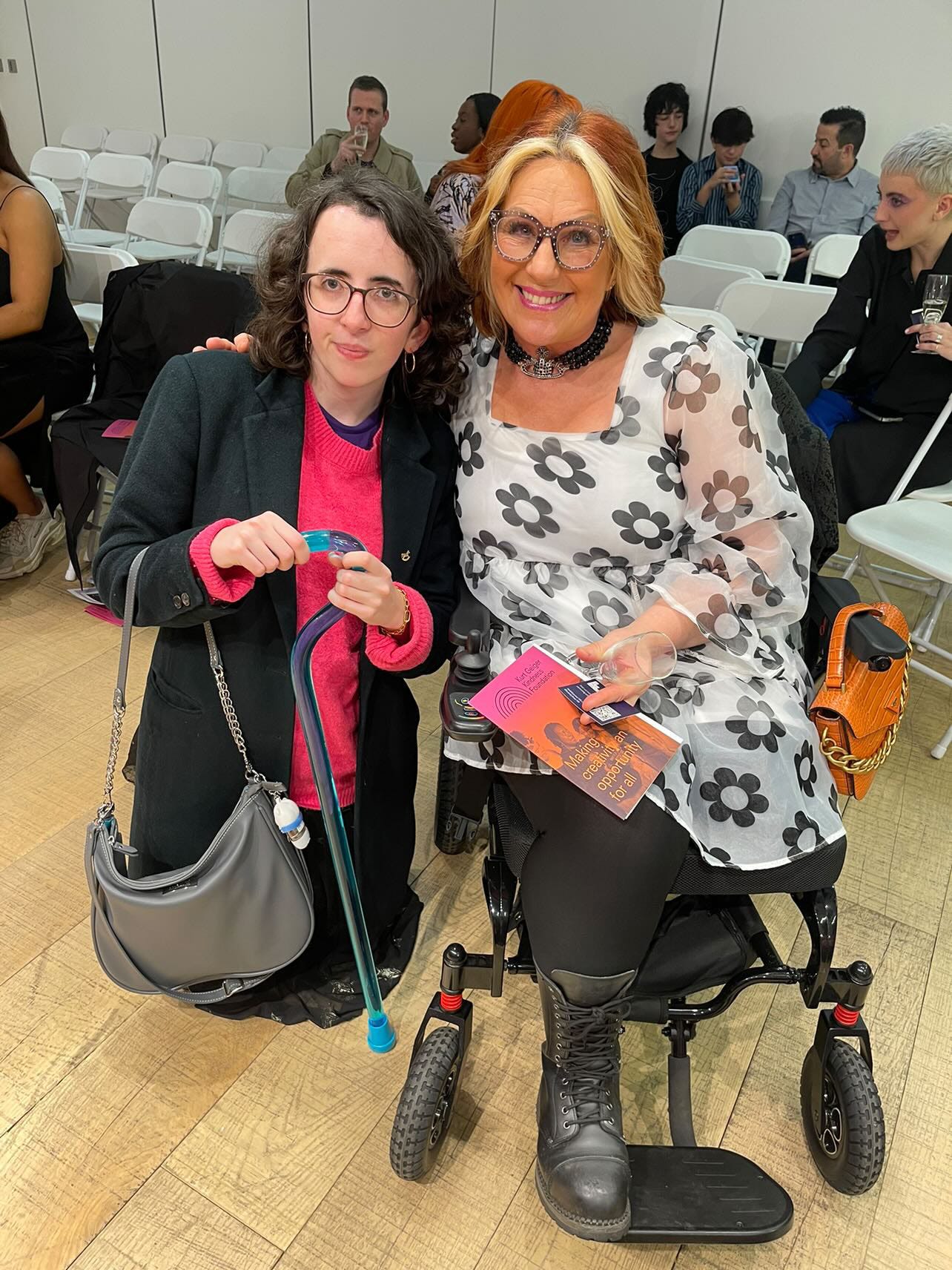One of the more exciting parts of the slow working week last week was the arrival of my new cane from NeoWalk. These are custom made canes for a range of issues, and they also have a wide range of accessories; they are also so damn colourful and beautiful. I can’t describe just how excited I was for this package.
It’s the right size at long last. It’s also Barbiecore pink. It has a new strap to match, too, which is coming in the mail soon.
Dealing with an ongoing balance issue and other stuff related to being a Long Covid patient has felt never-ending - but I wish someone had flouted the idea of a cane to me months ago. It has largely been a positive experience - in being able to do more, attend work events, and to not be so horribly tired at the end of each day.
I liked how NeoWalk has also made this something fun, stylish, and all the while, practical - it’s a form of self expression. It has felt like I have almost been robbed - in, for example, having to effectively re-learn motorskills (Shorthand to the same standard took me a year to get back), and to deal with unfounded expectations, too. I will live without shame, and I will live freely, how I like, as a disabled person.

If there’s one thing I’d like contemporary feminism to do, I’d like it to be this: we need to highlight the misogynistic policing of mobility aids when it comes to harassment. Because these are two intimately tied concepts.
While it’s great that we talk about and now have the vocabulary to name unwarranted behaviours - such as catcalling - there is so little when it comes to disabled women. Conversations with friends who are wheelchair users, for example, who have had people follow them, push them in said chair without consent, etc - this gets missed too much. Sometimes it is a tiny part of a discussion - but again, it isn’t given due consideration. Some statistics also point to how disabled women are more at risk of behaviours such as physical abuse - and, arguably, to combat the issue, we need to be a part of this discussion.
So here is a very long thought from a 1:00am writing session last week.
If you’d like to support my writing, please consider subscribing to this newsletter by clicking the button below.
See you soon! x
Content note: This newsletter references misogyny as well as internalised ableism and harassment.
Mobility aids are a controversial topic - if you are tapped into internalised ableism, or listening to presumptions around from others too much. I have a confession to make; I started to use a cane to support myself when out and about in February, as part of my Long Covid recovery. And I wish I had gotten myself one months before.
Too many falls meant bruises and cuts would sketch themselves out across my body - and on far too many occasions, and often in front of people. Covid fatigue has meant that even tiny things - such as walking to the end of the road - would mean afternoons asleep, by way of energy recovery. There were too many lost pockets of time. In a newsroom, in front of my family, on the Eurostar when travelling - it’s overwhelming to deal with, especially when you ostensibly look ‘healthy’. This is all invisible.
The commentary of concern - be it people diagnosing me from a Google search (note: this is actually quite a crappy thing to do, and is unhelpful to the extreme) or those who stood nervously on standby - was too hard to bear at times. Dealing with this part of newly emerging symptoms meant giving up some activities I liked to do, or waiting until the fatigue/tiredness would stop. It felt like matters needed to be taken to task.
At Naidex last year I met the coolest disability entrepreneur, Lyndsay.
NeoWalk specialise in custom made walking canes - to your height, as well as handles specific to your needs. (So, if you are an EDS patient, or if you need something a bit more sturdy.) Plus, they were actually pretty - you could go for block colours, light up canes, and more. There were also accessories - such as to change the colour of your cane, if you needed a wrist strap, and more. Disability doesn’t have to be practical in nature, boring by a limited colour palette of beige and bland hues. They’re made out of a smooth, plastic-like material; they shine and they glitter, there is no shame in embracing a disability need. This was being unapologetic, and living without shame.
I think this is the ultimate feminist act - to unpick an internalised ableism, to help yourself, and to do so in a way that is unapologetic.
My use may be ambulatory, but my needs are still legitimate.
The Tiffany cane gave me some of my confidence back - and also took away a lot of my anxiety. It meant that my legs couldn’t lock as much or pull me to the floor unless the circumstances were extreme; I could walk fluently, and even retrieved some speed I’d lost. It holds me upright. It also meant that activities I’d lost or that had caused panic attacks or anxiety, were being re-wired in my brain; I could take part. In-person events had been something I dreaded a lot.
And it also delayed and spaced out tiredness; I could do a lot more, stay awake longer, and start to feel functional again. Plus, it’s electric blue! With rhinestones on a strap that can also be re-purposed if I ever do not need it. This has been a great investment, and I wish I’d done it earlier. I feel a lot happier and so much more confident. I even had a model compliment my cane at fashion week, which was the first time I’d gone out without it, too!

It’s also not a permission to approach me, to comment or to police my body.
I’m disabled in some respects, and I’m also female - so I tick the box for some quite negative statistics, such as when it comes to topics such as harassment or coming into contact with the police. There is a doubling up of an impossible tightrope in being ‘visibly’ disabled, something I hadn’t entirely considered before.
My use of a mobility aid is not a permission to approach me, to comment on my body, to ask me ‘what happened’, or to police how I move around.
It’s unwarranted and has a negative impact as a way of power play.
This part of harassment is so rarely talked about by leading feminists - harassment of disabled women, for being disabled. It’s a form of everyday sexism I’ve come to brace myself against, as much as I love my cane. I’d not really considered this before - as previously I could ‘hide’ in plain sight. A cane makes me visible in a new way.
It’s intrusive and also no-ones business. No one is owed an explanation or the emotional labour on my part; I write this now to take back that power, and to not be ‘outed’ as I have been previously.
My local coffee shop had a guy commenting (in an unsolicited way) on how I walked - and the next day, I came in with my cane, in response to the intrusive questions on what had happened to me. The same man came to sit nearby, staring at the cane and me, which was so uncomfortable.
There have been some strange interactions - such as the man who aggressively planted himself in front of me, to tell me how to cross the road, who continued to stare at me.... Yep. As if I was a child. It’s not a crime to just exist, and to want to be left alone when out and about.
Then, we need to talk about S - the individual who thought it appropriate to misdirect me off my train recently. The train screens were not working, and the driver was uncommunicative - so I’d tried to ask for help. I’d tried to check the sign on the station - but was too slow, and the train left without me. Half an hour to go back to London, with S - a complete stranger - behaving erratically around me, enough to be on red alert.
He’d tried to get physically closer in seemingly mimicking me, talking and asking questions - but it was enough so I wasn’t saying anything about me. I said my name was Anna - I wouldn’t sit in the tiny shed of a waiting room, which he had tried to press on me. No one was around, no guard, no one to help and limited phone signal. Intrusive questions again - why the cane, what happened to me, what was that like, did I sleep okay now?
Then, the kicker: “Have you seen a brain laid on an MRI, Anna?” The trees across the track ostensibly bore some resemblance. The face changed at that point; it was another person in his place. Time to go and to make space - call a friend to stay on the line, to calm you down and to assist with a brain on haywire. My cane was broken in trying to get away; it’s missing a chunk at the top, leaving a spiky point. (This’ll be used for things like walks on the South Downs now, as it’s more ‘heavy duty’.)
This is a snapshot of just under a month and a half.
NeoWalk has been an absolute game changer; I have loved being able to speak in front of audiences again, as well as to be able to take part in events for longer periods of more sustained time. So many of my Covid related symptoms have been significantly reduced in adding this tiny change for longer journeys, such as to London or if I need to walk for long periods. It’s given me back a lot, in what I’d lost in a year since catching Omicron.

I also have a lot more confidence, such as being able to sit in court rooms again, and manage just that little bit better while I wait for a treatment plan - but my mobility aid is not a permission to police my body or my choices.
I as a disabled woman have the right to exist freely in the space I inhabit, without having to justify myself or my access needs.
My debut book is out now - and this is what people are saying about it.
“The Autism Friendly Cookbook is a striking manifesto on the importance of accessibility in cooking. With adaptations front and centre, this book from Lydia Wilkins is sure to become a kitchen staple.”
- Natasha Lipman, journalist and host of The Rest Room podcast:
“Cooking is one of the foundations of independent living. This charming, inviting book is designed to make this basic life-skill accessible to everyone. It's not just a collection of tantalizing recipes, it's a celebration of autistic community.”
- Steve Silberman, author of NeuroTribes: The Legacy of Autism and the Future of Neurodiversity:
“A delightful guide full of important information for neurodivergent foodies - we've needed this for years!”
- Chloe Johnson, editor at Disability Review Magazine
Resources
Last call for tonight: there’s a webinar about my book taking place! Get your ticket here.





